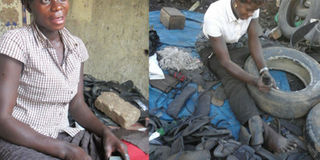She caught her break from making sandals out of tyres

Ms Amina Kokongeza in her workshop.
Twenty four-year-old Amina Kokwongeza, a mother of two, says she was forced to resort to making tire sandals (lugabire) after her husband’s failure to raise money for upkeep.
A resident of Kasijagirwa barracks in Masaka District, Kokwongeza says the idea of making lugabire came to her in 2004 after her husband, Nasur Mubiru, failed to cover the Shs10,000 required to treat their child when he was diagnosed with malaria.
“I resorted to borrowing money from a friend that I promised to pay back later,” she says adding, “We were so poor. I had to think of something to save my only boy to see that I raise money for treatment and take him in hospital” Ms Kokwongeza argues.
She requested him to teach her how to make lugabire and he accepted. “My husband welcomed the idea of working together and he quickly started teaching me how to make the sandals,” she narrates, adding that most of her husband’s family members also earn from the same trade so she strongly believed it would help her situation too.
Tyre sandals are made from either motorcycle or car tyres. Crafting tyre sandals is a great way to recycle worn out tyres, and the resulting minimalist footwear provides ample comfort and durability for all-time wear.
Although you can use a variety of materials and methods for the straps, the basic process for making tyre sandals is always the same.
She says these sandals can take about 30 to 40 minutes to make. Required materials include small nails, knives, nad tyres.
According to Kokwongeza, it takes a four-step process to make the tyre sandles.
Challenges
Kokwongeza says that although this business brings in money, it is not much. A pair of sandals goes for between Shs1,000 and Shs2,000 only, depending on age of the intended wearer. Children’s cost Shs1,000 while adults go for Shs2,000.
The only way to accumulate enough money to save therefore is by selling in bulk as a whole seller which is also not easy. “There are also more people selling the same in Masaka now, so the only way to earn a substantial amount is to hawk them,” Kokwongeza explains.
While she buys a tyre, which provides the raw material for making the sandals, at between Shs6,000 and Shs10,000, at most, Kokwongeza earns between Shs10,000 and Shs20,000 a week.
She, however, does not compare the inconvenience and challenges of this job to the time she used to work in a hotel where she was despised by men and fellow women. She says this eventually made her quit and stay home until she decided to make lugabires.
Benefits of the job
Kokwongeza says that she has managed to raise school fees for her son and looking forward to buying own land to build a small house in a few years to come using her savings.
“It is better for someone to raise money from his or her sweat, especially women because it helps you to plan well for your family and future plans,” she says adding that it is difficult to depend on a man because you cannot read what is on his mind. She, however, abuses the practice of women waiting for men to provide everything to them.
Future plans:
She prays that God can listen to her and grant her a bigger market to enable her business to grow.
Meanwhile, Kokwongeza decided to leave her work place and work from home. She explains that it was for health reasons.
“There was construction work going on nearby and I could not bear the dust. I now work from home and hawk my merchandise.” She, however, says many people undermine her because they look at her in the other aspect of men.
Public perception
Juliet Tusiime, a resident of Masaka District, says she is amused by Kokwongeza’s work because she can fend for herself. She says she is privileged to live with such people in society because they contribute much towards the country development.
Joseph Kisekka, 31, another resident, says many people should adopt her example, especially the youths, to help cut down on the numbers of the unemployed.




